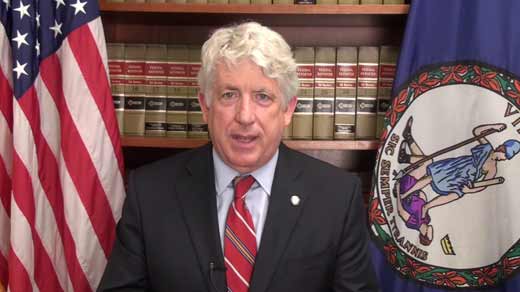
The Virginia Attorney General’s office has complained about an opinion piece that I wrote last week in The Washington Post that accused the state of failing to adequately investigate the death of Jamycheal Mitchell. He is the 24 year-old inmate with schizophrenia who died last August from a heart attack caused by starvation after he was arrested for allegedly stealing $5 of snacks from a convenience store and spent 101 days in jail.
In a letter to the newspaper, Cynthia E. Hudson, the chief deputy attorney general, wrote:
Contrary to Pete Earley’s May 15 Local Opinions essay, “Awaiting answers on Jamycheal Mitchell’s death,” the Office of the Attorney General has never and would never advise a client agency to obstruct an investigation.
Ms. Hudson stated:
Virginia Attorney General Mark R. Herring (D) shares the “concerns and the frustration of many Virginians over the lack of clear answers surrounding Mitchell’s death.”
Really?
Here’s a reminder of the shenanigans that have happened in Virginia revolving around Mitchell’s death.
Under state law, the Department of Behavioral Health and Developmental Services (DBHDS) was required to conduct an inquiry. It finished its report in December 2015, roughly four months after Mitchell’s death.
What happened to that report? According to the state, the DBHDS report was “forwarded to the (DBHDS) Assistant Commissioner for Forensic Services for review and then to the Office of the Attorney General.”
We don’t know who sat on it, but one or both of them did – for the next four months.
Why is that significant?
Because during the four months those offices were sitting on that report, Virginia’s state legislature was in session. That’s right. The inquiry by the DBHDS – that was being reviewed by the Attorney General – wasn’t made public until after the state assembly adjourned and only was released after advocates began complaining.
Coincidence or politics?
Let’s move on.
The DBHDS report did not affix blame inside the jail so you might assume that the Office of State Inspector General would investigate jail officials when it looked into Mitchell’s death.
Nope. Instead the State Inspector General included this disclaimer when it issued its investigative report:
The scope of this review was not to evaluate the medical care provided in HRRJ, nor to repeat every element of prior investigations related to this event.
Prior investigations? The only investigation into what actually happened inside that jail and who was responsible for safeguarding Mitchell was done by jail officials. That’s right. The same officials who ran the jail investigated themselves. And they announced eight days after Mitchell’s body was found that they had investigated and, surprise, surprise, hadn’t done anything wrong. They have refused to make public their internal probe. These are the same jail officials who taped over recordings taken by a video camera outside Mitchell’s cell that would have shown whether he was being fed and eyeballed by correctional officers and nurses every day.
So why didn’t the Inspector General investigate medical care and what actually happened, day-in and day-out?
Investigators were told that they didn’t have jurisdiction.
Who told them that?
You can find the answer in this story from the Richmond Times Dispatch:
Julie Grimes, spokeswoman for the state inspector general, said investigators with the office relied on guidance that the Office of the Attorney General provided them in November 2015 when determining what it had jurisdiction to review.
That’s the same Attorney General’s office that now is claiming it shares the public’s concern about the unanswered questions involving Mitchell’s death.
But wait, it gets better.
Ms. Hudson wrote that I had falsely accused the Attorney General’s office of obstructing an investigation. Where did I get that impression? It was based on a story in the Richmond Times-Dispatch, entitled: Flaws Revealed in Probe of Portsmouth Jail Death, which I credited in my Op Ed.
The last time that I checked, the Richmond newspaper was a credible news organization.
What did the first two paragraphs of that story report:
One of the state agencies charged with investigating the death of Jamycheal Mitchell in his jail cell in Portsmouth last year did not interview court employees responsible for his case because the state Attorney General’s Office intervened on the employees’ behalf.
Another agency conducting a separate investigation into Mitchell’s death, the Office of the State Inspector General, also did not interview the court’s employees because it believed — based on secondhand information it said it received from the jail where Mitchell died — that the Attorney General’s Office would block its access.
Read that story for yourself and decide if you think the Attorney General was concerned about helping ferret out the truth or was more interested in protecting the state from a costly lawsuit. Or you can just skip to this paragraph in that story.
State Sen. Creigh Deeds, D-Bath, said the Office of the Inspector General… should have asked the court for interviews and documents even if it suspected the Attorney General’s Office advised the court not to speak to investigators. “
But let’s stop quibbling about who said what and who did what.
There’s a simple way for Attorney General Mark R. Herring to assure the public that he really shares “the concerns and the frustration of many Virginians over the lack of clear answers surrounding Mitchell’s death.”
As Attorney General, Herring can call on the Virginia State Police to do what the Office of State Inspector General and the DBHDS failed to do. He can ask the police to go into the jail and determine if criminal charges should be filed against those who were responsible for watching over Mitchell. (The Portsmouth Commonwealth attorney has met with the state police, but no formal investigation has been launched.)
Instead of having his underlings complain about my OP Ed to the Post, Herring could initiate an investigation, but having that authority to do that and the political courage to do it are two separate matters.



